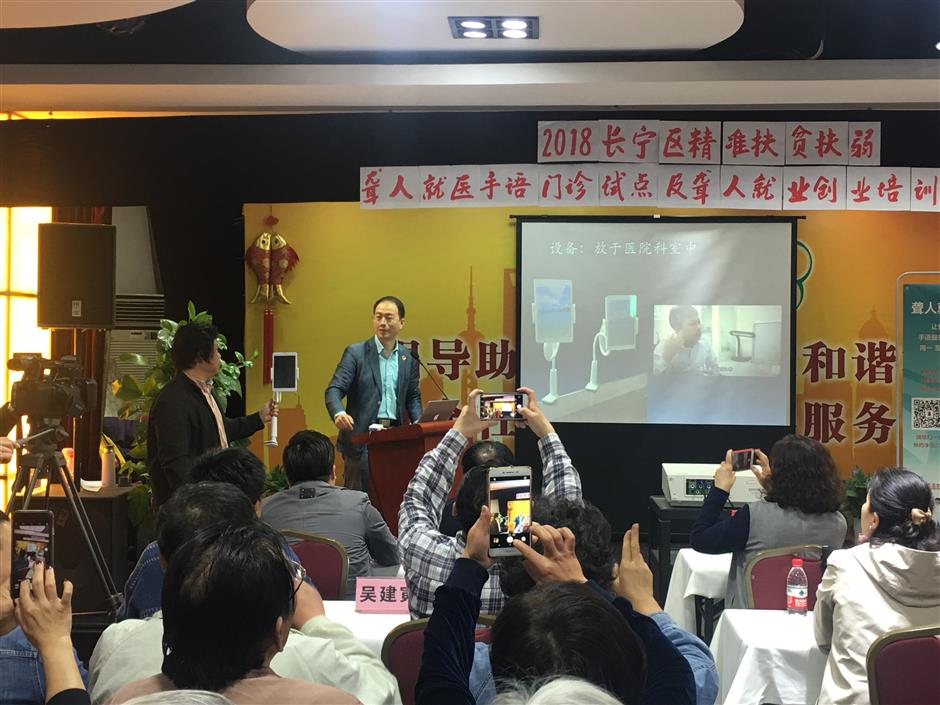Hearing-impaired to receive hospital translation services

Li Bin, a project management director with the Shanghai Association for Youth Entrepreneurship and Employment, introduces the interpretation facility his team developed in Changning District.
A trial project was launched in a downtown hospital yesterday to open specialized outpatient services for hearing-impaired people, which will eventually be promoted citywide.
The practice relies on both sign language volunteers and remote interpretation facilities and will initially be carried out at Shanghai's Tongren Hospital in Changning District.
It will then gradually be promoted at Shanghai General Hospital and Jing'an District Central Hospital later this year, Li Bin, a project management director with Shanghai Association for Youth Entrepreneurship and Employment, said.
"The project is targeted at allowing local hearing-impaired patients to enjoy the same medical services as other citizens every day," Li said at the launch ceremony at Changning District Disabled Person's Federation. Dozens of hearing-impaired residents living nearby witnessed and lauded the launch of the project.
Shanghai has about 250,000 hearing-impaired people, including an increasing number from the aging population with chronic diseases who need regular medical services at hospital.
However, there are only 5,000 certified sign language interpreters citywide, including many part-time interpreters who cannot translate medical sign language, Li said.
According to a survey released yesterday, over 60 percent of local hearing-impaired people go to hospitals at most three times a year, mainly concerning communication difficulties with doctors. The average elderly person goes three times as many times, according to the city's health authority.
At present, hearing-impaired patients "talk" with doctors through gestures and writing. Such a system wastes time and can result in misunderstandings, Li added.
"Many hearing-impaired patients are not well-educated and their written description of symptoms is likely to mislead doctors," said Li.
He has led a team which includes some hearing-impaired members in developing the project since 2016. It trains doctors and volunteers in medical sign language and offers free services to hearing-impaired patients at local hospitals.
Bian Haifang, one of the few senior sign language interpreters in the city, has voluntarily interpreted for hearing-impaired patients at Shanghai East Hospital for five years. She offers her services every Friday afternoon and has helped serve over 10,000 hearing-impaired patients.
"The demands are far beyond our capabilities," she said. "Many hearing-impaired patients delay plans to go to hospital due to a shortage of interpretation services and later developed more serious conditions."
To meet demand, Li's team has developed a facility with a screen and microphone that can be put on the clinic table. Doctors and their hearing-impaired patients can receive interpretation remotely by volunteers.
"Our team is developing an AI system to learn the algorithm of sign language, which is expected to solve the difficulties of communicating with doctors for the total of some 20 million hearing-impaired people in China," Li said.
Sign language interpretation is common at hospitals in foreign countries like the United States and Japan thanks to government subsidies. The average price for sign language interpretation services is about 200 yuan (US$31.8) per hour, which is unaffordable for most hearing-impaired people, Li said.
Meanwhile, her team also launched another project at the Changning federation yesterday to encourage hearing-impaired people to take part in various training courses to help in finding employment.
The first batch of 15 courses have been released with cooperation from the district's youth activity center, covering sign language, e-commerce, housekeeping, cooking, babysitting and photography.















